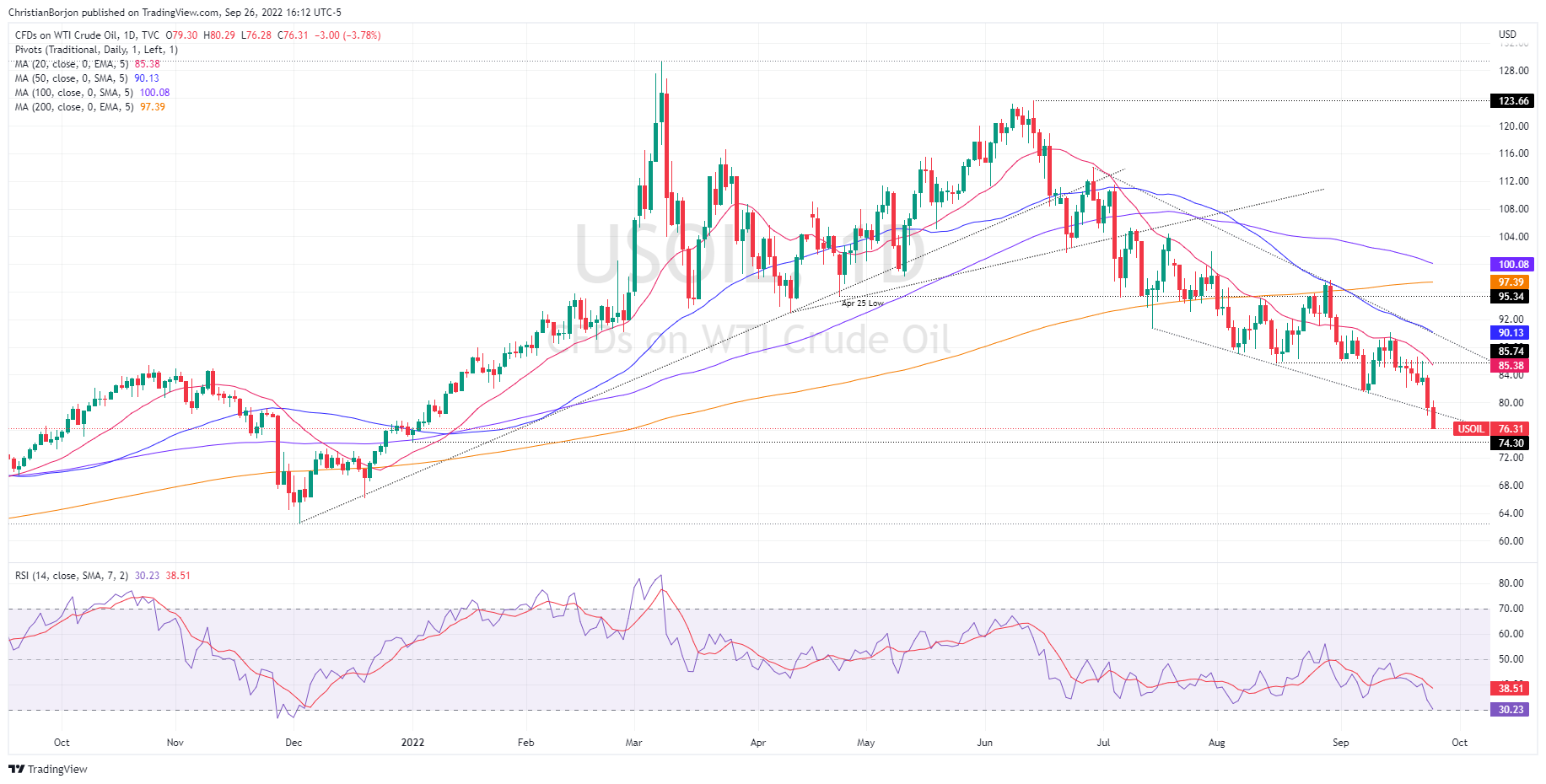- Analytics
- News and Tools
- Market News
- WTI drops to fresh eight-month-lows below $74.50 per barrel on buoyant US dollar
WTI drops to fresh eight-month-lows below $74.50 per barrel on buoyant US dollar
- WTI is falling close to 4% on Monday on recession fears.
- Fed policymakers emphasized the need for further rate increases as inflation remains stickier.
- The US Dollar Index extended its gains and recorded a fresh 20-year high at 114.53, a headwind for oil prices.
On Monday, the US crude oil benchmark, also known as WTI (Western Texas Intermediate), drops for the second straight day after sliding from above the $80 per barrel figure to the mid $70-$80s range. At the time of writing, WTI is exchanging hands at $76.31 per barrel, down by 3.63%.
Oil prices fell on emerging recession fears
Worries about a global economic slowdown are mounting, as energy prices have shown. Last week’s 75 bps rate hike by the Fed, alongside another 425 bps of worldwide central banks, fueled worries of a recession. Therefore, WTI remains defensive, as lower demand implies lower prices.
Sources cited by Reuters said, “With more and more central banks being forced to take extraordinary measures no matter the cost to the economy, demand is going to take a hit which could help rebalance the oil market.”
Another factor weighing US crude oil prices is the rapid rise of the greenback. The US Dollar Index, a gauge of the buck’s value vs. a basket of six currencies, edges up 0.98% at 114.128, a headwind for oil and US dollar-denominated commodities.
Elsewhere, Fed officials crossed newswires on Monday. The Boston Fed President Susan Collins expressed that further tightening is needed to temper inflation and emphasized that the unemployment rate should rise to achieve the Fed goal. Echoing her comments was Cleveland’s Fed President Loretta Mester, alongside Atlanta’s Fed President Raphael Bostic.
Oil traders’ attention turns to further US economic to be released ahead of the Organization of the Petroleum Exporting Countries (OPEC) and allies reunion, to be hosted on October 5. The US calendar will feature durable good orders, consumer confidence, and further Fed speaking, led by Fed Chair Jerome Powell, on Tuesday.
WTI Daily Chart
WTI Key Technical Levels
© 2000-2026. All rights reserved.
This site is managed by Teletrade D.J. LLC 2351 LLC 2022 (Euro House, Richmond Hill Road, Kingstown, VC0100, St. Vincent and the Grenadines).
The information on this website is for informational purposes only and does not constitute any investment advice.
The company does not serve or provide services to customers who are residents of the US, Canada, Iran, The Democratic People's Republic of Korea, Yemen and FATF blacklisted countries.
Making transactions on financial markets with marginal financial instruments opens up wide possibilities and allows investors who are willing to take risks to earn high profits, carrying a potentially high risk of losses at the same time. Therefore you should responsibly approach the issue of choosing the appropriate investment strategy, taking the available resources into account, before starting trading.
Use of the information: full or partial use of materials from this website must always be referenced to TeleTrade as the source of information. Use of the materials on the Internet must be accompanied by a hyperlink to teletrade.org. Automatic import of materials and information from this website is prohibited.
Please contact our PR department if you have any questions or need assistance at pr@teletrade.global.
















